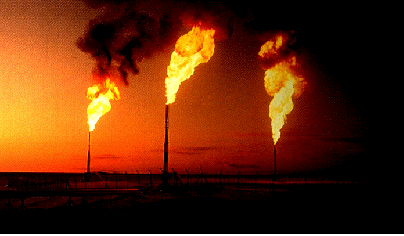Since February 2008 when the Nigerian Gas Master Plan (NGMP) was approved, very little has been achieved to stimulate growth in the gas sector of Nigeria. The NGMP which was designed to boost the gas sector with its vast gas resources in order to attain a full market-driven status, has fallen short of expectations as Nigeria has neither experienced a long-term energy security, nor has it enjoyed a competitive advantage in the high-value gas export market.
Instead, a situation of persistent gas-flaring mainly in the oil and gas producing communities of the Niger Delta region, has become the order of the day and the extremely abundant gas resources have regrettably spelt doom, rather than boom, for the people whose environment is perpetually devastated by the incessant emission of greenhouse gases into the atmosphere. Gas-flaring in Nigeria, dates back to 1956 when oil was first discovered in the country, and as oil production increased, so has associated gas production, of which the gas is often regarded as a waste product, disposed into the atmosphere.
Statistics indicate that Nigeria has about 179 trillion cubit feet of proven gas reserves. Yet, according to a recently released report by the Nigerian National Petroleum Corporation, NNPC, Nigeria lost $198.775 million (about N31.8 billion), to gas flaring in the month of February, 2014. The NNPC data further revealed that the amount of gas flared was 50.098 billion Standard Cubic Feet (SCF) which is equivalent to 23.2 percent of the total gas produced in the period, being 215.93 billion SCF. Independent oil companies, marginal field operators, production sharing companies and joint venture operators, have all been involved in gas flaring to varying degrees, without being adequately checkmated by the Nigerian government. So far, government’s efforts at curbing the menace of gas flaring have been feeble and grossly inadequate, as Nigeria remains one of the largest gas-flarers in the world.
The just-concluded 2014 National Conference inaugurated by President Goodluck Jonathan, recommended in its final Report, that gas-flaring should be criminalised in Nigeria and offenders be made to pay the commercial value of the flared gas, while communities prone to gas-flaring, should be paid compensation for the effects of gas-flaring. A delegate at the Conference, Mr Nnimmo Bassey, who commented on the need for gas-flaring to be outlawed in Nigeria, explained that: “The gas being flared in the oil fields, impacts human health and it causes acid rain, cancer, breathing difficulties, skin diseases, etc. We cannot continue to kill our people on the altar of cash; we need to have an environment where people can survive.”
The Head of Trade and Climate Advocacy of the Social Development Integrated Centre (Social Action), Vivian Bellonwu, has lamented that “climate change and its resultant effects, are fostered by global warming which is a primary consequence of gas-flaring. In 2011, Social Action conducted a survey of the Environmental Impact Assessment (EIA) of the Brass Liquefied Natural Gas (LNG) project. The survey, of which a Report was published, was carried out in the main project communities of Twon-Brass, Okpo-Ama and Ewo-Ama, and it was discovered that the constant gas-flaring and gas extraction, caused air pollution which endangered the lives of humans, animals and plants. Yet, while these problems persist till date, the creation of the multi-billion naira gas project has not mitigated the menace of gas flaring which still continues unabated”.
A major challenge inhibiting the development of the gas sector and the bid to end gas-flaring in Nigeria, is the unwillingness of the government and private investors to invest sufficiently in the sector which is seen as lacking competitiveness owing to the low fixed prices for domestic users, as well as the uncertainties caused by the non-passage of the Petroleum Industry Bill (PIB) into law. This dearth of investors, has in no small way, hampered the production and supply of gas for domestic use and also for power generation. Other challenges are the inadequate infrastructure and the poor regulatory system in the sector.
But Nigeria’s gas market, despite its shortcomings, has significant resource potential which if prudently harnessed, could be sufficient to meet domestic and international demands.
We therefore make a clarion call to the Nigerian government to harness the abundant gas resources available in the country, with a view to enhance the economic development of the nation. The power sector for instance, will improve greatly if there are more gas supplies to power plants which would ultimately lead to more power supply – a necessity for the development of several sectors of the economy.
We urge the President Goodluck Jonathan-led government, to create the enabling environment for the private sector to invest hugely in the entire value chain of gas production as this could help to revamp the sector and encourage oil companies to recycle, rather than waste, the gas flared during oil production.
We join in the call for gas-flaring to be outlawed and regarded as an economic crime in Nigeria. The Nigerian government needs to put in place, legislations and policies that can efficiently regulate the gas sector, specifically the prohibition of gas-wastage through flaring.
GAS-FLARING : THE BANE OF THE GAS SECTOR IN NIGERIA.

